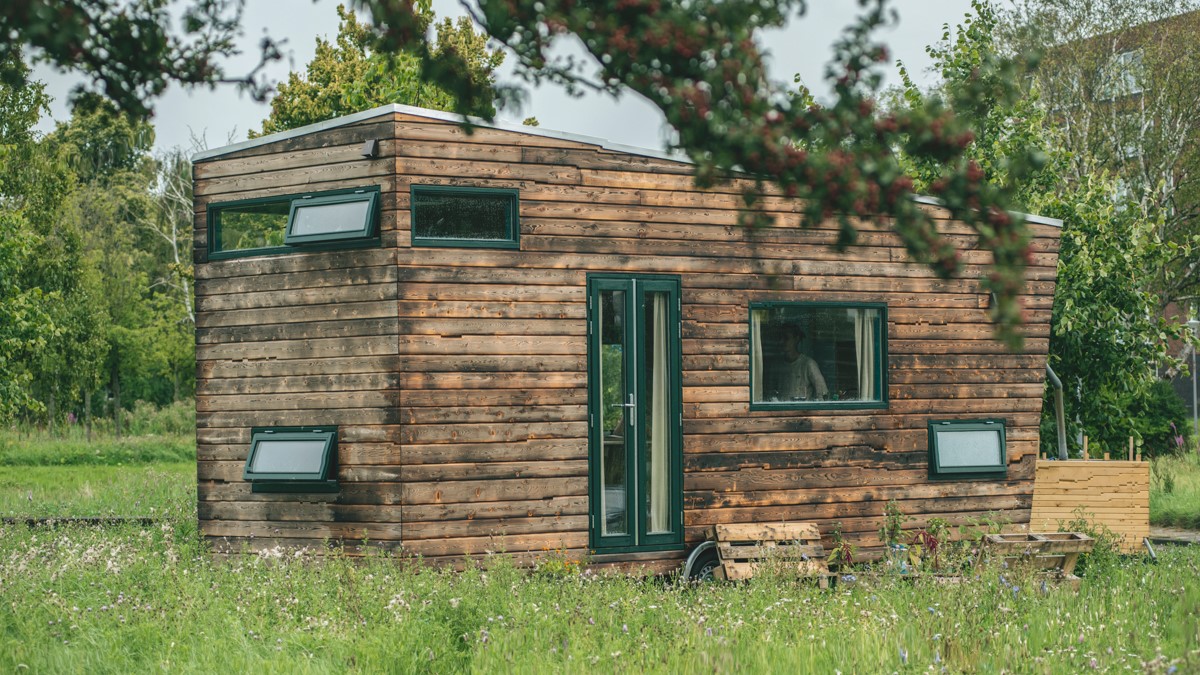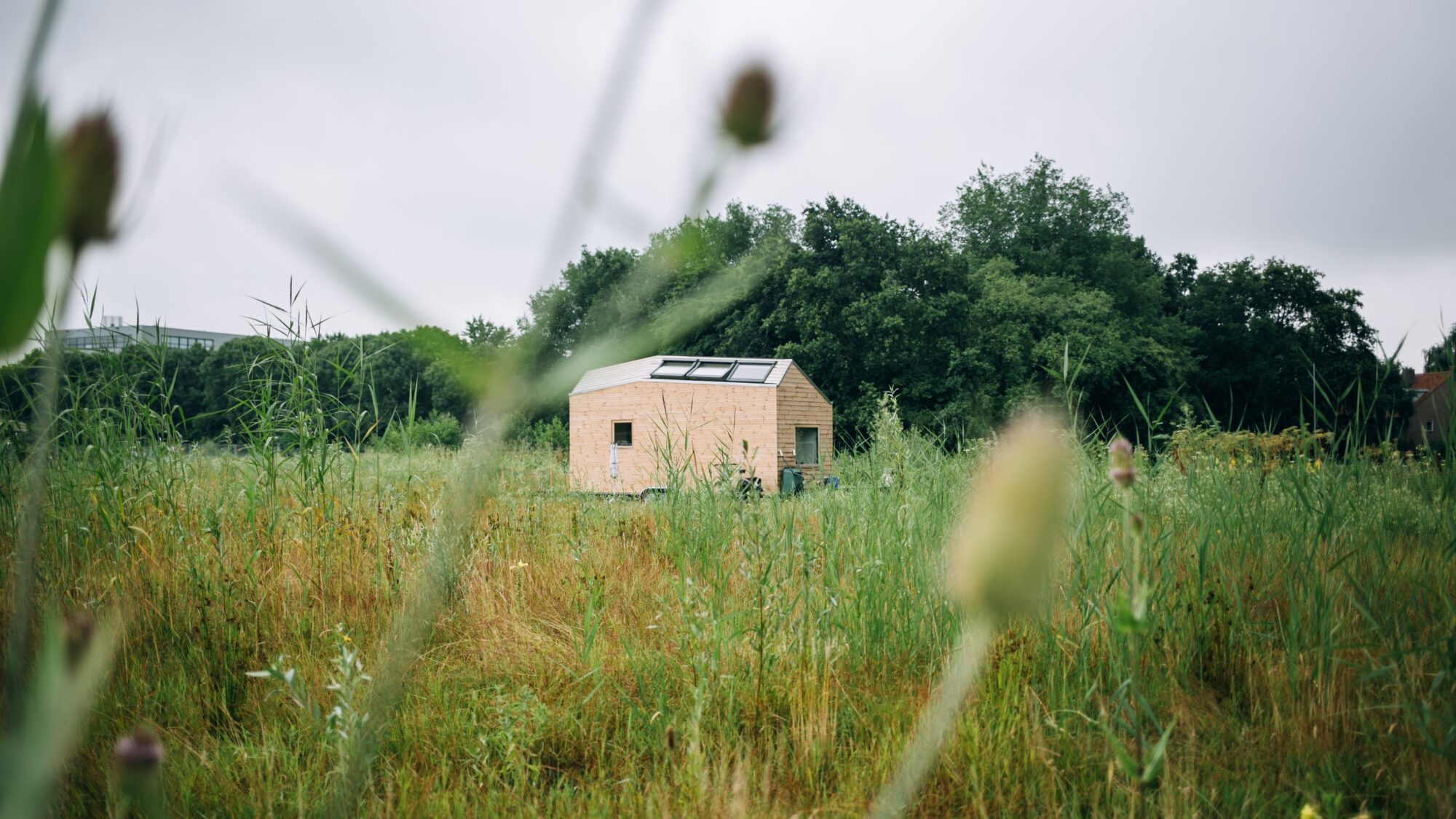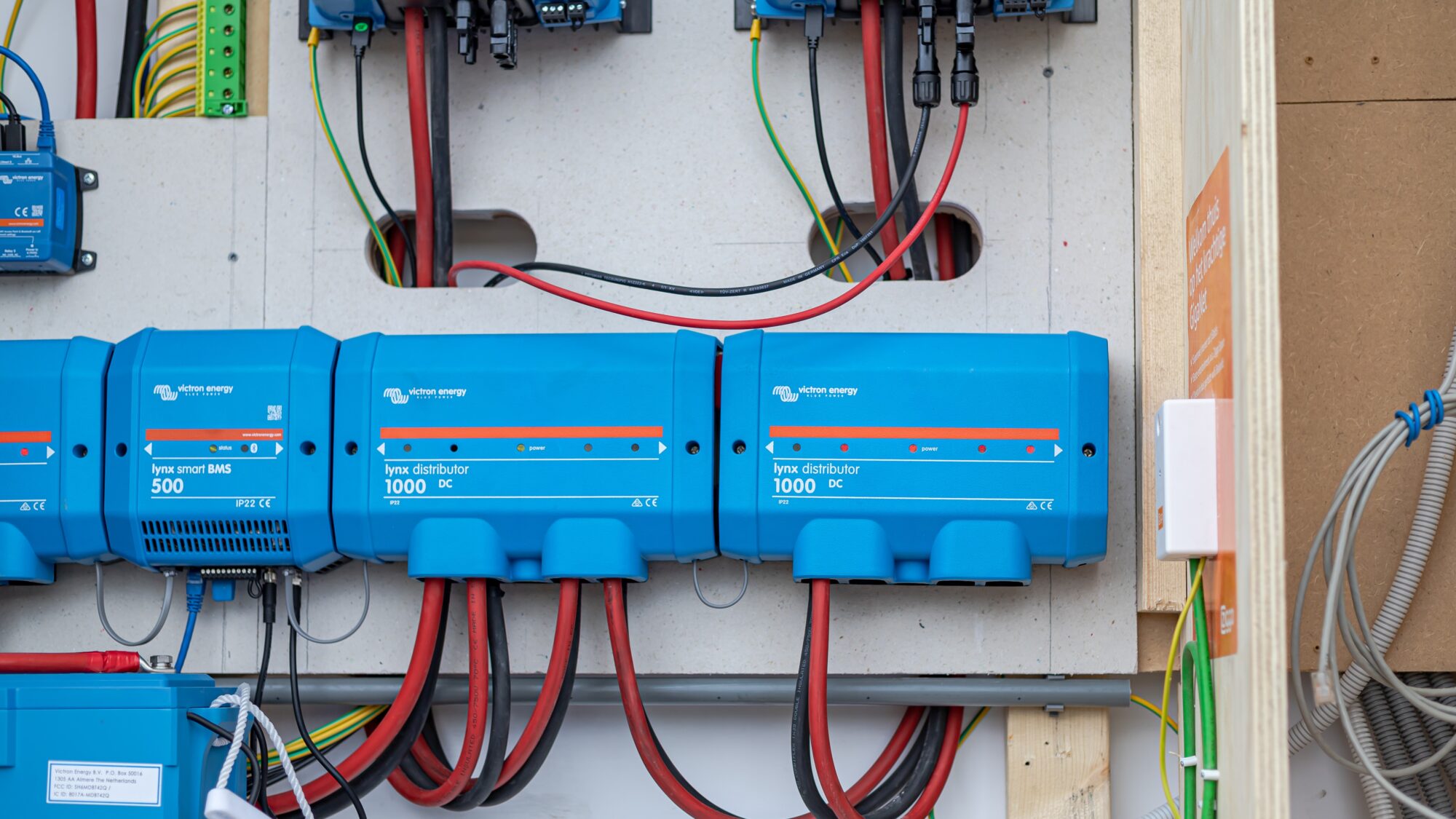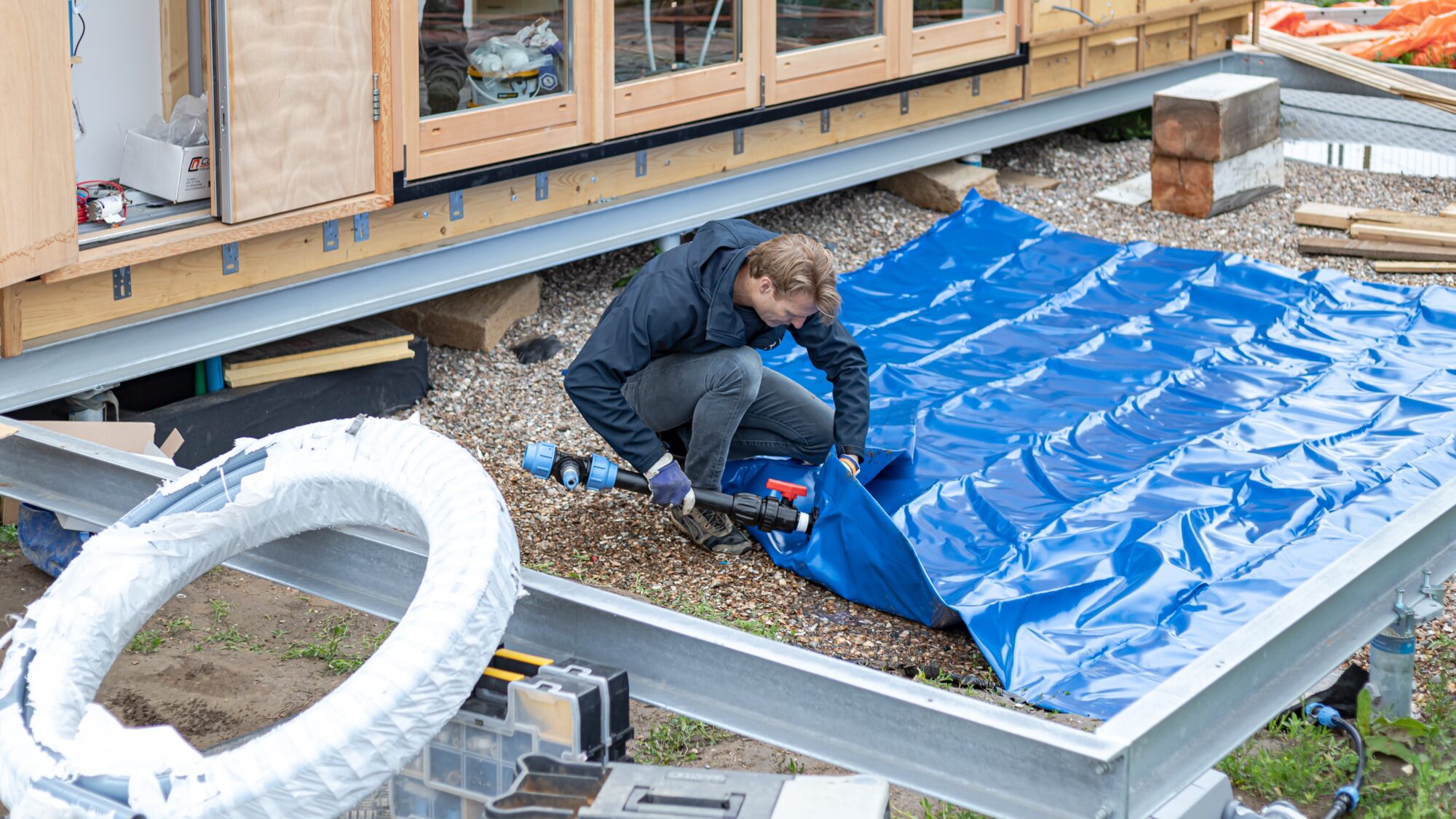Off-grid living is loved by Tiny House residents: self-sufficient, not dependent on energy contracts with highly fluctuating prices and sustainable enough to generate energy, heat and water close to home and to drain your sewer contents close to home. Some go completely without municipal facilities, others opt for more security through a connection to, for example, only water, electricity or the sewer.
Off-grid regulations
If you want to live off-grid, you have to discuss this with the municipality and then you end up in regulations, where you can easily lose track. Ron de Vrieze of Entrance (Centre of Expertise Energy in Groningen) and consultancy firm Tandem Vormgeving en Bouwadvies (Loppersum) wanted to know exactly how this works: ‘Because there seems to be quite a bit of policy arbitrariness that citizens and the construction industry encounter. To the outside world, the freedom of policy choice appears to be becoming quite broad. We think this is a current topic, especially with the Environmental Act and the environmental plans to be drawn up.’
Jolinde Kerbof is a student at Hanze University of Applied Sciences, studying Social Legal Services. She took up the challenge, investigated the rules of off-grid living and graduated in June with a super interesting and informative report: Back to the future: off-grid living. In her graduation report she explains in detail the benefits, legal options and bottlenecks of off-grid living in the Netherlands.

The benefits of off-grid living
Off-grid living means that the home is not connected to utilities. There is therefore no connection to the distribution network for gas, electricity, heat, water and sewerage. In short: the house is completely self-sufficient.
Jolinde sees many advantages: ‘There are various reasons why people want to live off-grid. This means it is generally more sustainable and therefore better for the environment. In addition, it is cheaper. For example, by generating electricity themselves, the resident does not have to pay an energy bill. Residents also experience more freedom. This way they are not tied to contracts.’
Homes that can easily be built off-grid are Tiny Houses: ‘Because these houses are very small, much less energy needs to be generated to heat and supply the home with electricity than in a normal home.’
Jolinde’s research
Jolinde first formulated a clear research question: ”What are the possibilities and obstacles of off-grid living in the Netherlands in view of the Building Decree 2012, the Building Works Living Environment Decree, the zoning plan and soon the environmental plan and how does the municipality assess whether an exemption is granted? granted for the Building Decree 2012 or the Building Works and Living Environment Decree and whether an environmental permit is granted to deviate from the zoning plan or environmental plan when off-grid living is not permitted?”
The graduate then looked for relevant regulations, possible exemptions and permits and the motivations of municipalities to enable off-grid residential areas for small-scale living. Both a literature study and interviews with municipalities provided her with insights that allowed her to answer the research question.

The possibilities for off-grid living
If you want to live somewhere in the Netherlands, the building must comply with the Building Decree, but exceptions are possible, Jolinde knows from her research: ‘The connection obligation under the Building Decree will be canceled if there is an equivalent solution. This ensures that off-grid homes can be realized in the Netherlands. Whether there is an equivalent solution is assessed by the municipalities in different ways. This can ensure that one municipality regards a solution as equivalent, but the other municipality does not.’
The municipality can grant an environmental permit in two ways when off-grid living is not permitted under the zoning plan. Jolinde explains: ‘you can choose the route from the breadcrumb list [link to text 1 at the bottom of this paragraph] or from the extra-plan deviation [link to text 2 at the bottom of this paragraph]. The municipality has the policy freedom to decide whether or not to cooperate in the realization of off-grid homes. If the municipality decides to cooperate by granting an environmental permit, investigations will then have to be conducted. These studies must be carried out to determine whether there is good spatial planning and whether an environmental permit is not in conflict with (environmental) regulations.
It is possible to temporarily deviate from the zoning plan on the basis of the breadcrumb list (Appendix II, Article 4 Environmental Law Decree). The Bread List is a list of cases designated by General Administrative Order. In these cases, an environmental permit can be used to deviate from the zoning plan. This may include, for example, dormer windows and antenna installations, but also an environmental permit for temporary projects of a maximum of 10 years. This can therefore be a solution for temporary off-grid homes.
A second way to deviate from the zoning plan when off-grid living is not permitted is with an environmental permit for off-plan deviation. The application must contain situational drawings of the current and future situation. The application must also contain information about current and future use. In addition, the consequences for spatial planning must be indicated and the nature and scale of the project must be indicated.
Tips from Jolinde
Jolinde heeft nog wel een paar tips om je kansen te vergroten voor off-grid wonen:
Jolinde has a few tips to increase your chances for off-grid living:
1) ‘Enter a partnership with the municipality. In all municipalities interviewed for this study, there was cooperation between the initiators and the municipality. By working together with the municipality, there is a greater chance that the environmental permit will be granted and that the off-grid homes will be built.’
2) ‘Create off-grid homes in a municipality that has experience with off-grid living. Many municipalities have set up off-grid homes as a pilot. One of the reasons for realizing off-grid homes as a pilot is to see if it works well. Ask the municipalities whether they have good experience with off-grid homes. When a municipality has good experience with current off-grid homes and its residents, there is a greater chance of realizing off-grid homes for an indefinite period in collaboration with the municipality.

Picture: off-grid solar installation
3) Become a better discussion partner for the municipality
During discussions with the municipality, you may encounter legislation and regulations in which you come across complicated legal formulations. Jolinde will help you on your way:
The most important decisions that are used are the Building Decree 2012 and the Building Works and Living Environment Decree (Bbl). These decisions contain the provisions that are most important for off-grid living. The Building Decree includes the obligation to connect to utilities. This decision also states how an exemption can be granted from this connection obligation. This explains how off-grid living is legally possible. The Bbl (Building Environment Decree) will replace the Building Decree. This states that there is no obligation to connect to the utilities, but that the municipality can choose to include the connection obligation in the environmental plan.
The Environmental Act (Omgevingswet) is important because this new law will bring changes in the field of off-grid living. With effect from this law, the Bbl, among other things, will come into effect. In addition, with effect from the Environmental Act, the zoning plan will be changed in the environmental plan. To investigate what changes the environmental plan entails, the Environmental Act is important, because it contains everything about the environmental plan. In addition, the Environmental Act states when the connection obligation, if included in the environmental plan, will lapse. The Environmental Act is therefore also important, because it states how off-grid living will soon be possible.

Picture: rainwater harvesting system JustNimbus
Via the links below you will find an explanation of some frequently used terms:
The Building Decree 2012 contains regulations for all construction works for safety, health, usability, energy efficiency and the environment. Under the Building Decree 2012, homes must be connected to utilities. Yet it is possible to live off-grid in the Netherlands. This is because it is possible to obtain an exemption from the regulations in the Building Decree 2012 that state that homes must be connected to utilities. Whether the exemption is granted will be assessed by the municipality.
The Environmental Act is scheduled to be introduced on January 1, 2024. The Building Decree on Living Environment (Bbl) is part of this and will replace the Building Decree 2012. This will bring changes that may impact off-grid living.
In addition to the Building Decree 2012 and the Bbl, the zoning plan is also important. The zoning plan is a spatial plan that states what may happen to the space or land in a municipality. A zoning plan describes whether the land is intended for residential use or for another purpose. If the land is not intended for residential purposes, this does not mean that living here is not possible. It is possible to apply for an environmental permit from the municipality for building or using the land in violation of the zoning plan.
With effect from the Environmental Act, the zoning plan will be changed in the environmental plan. Municipalities currently have multiple zoning plans for one territory. With effect from the Environmental Act, every municipality must draw up one environmental plan for its entire territory. The purpose of the change to the zoning plan in the environmental plan is to enable municipalities to organize the environmental plans more flexibly than the zoning plans. This may also imply changes for off-grid living.
Here you will find Jolinde’s complete graduation report, in Dutch:
Photography: Marianka Pranger, Bluemonque, Margriet Alblas, Chiela van Meerwijk.


Leave a Reply